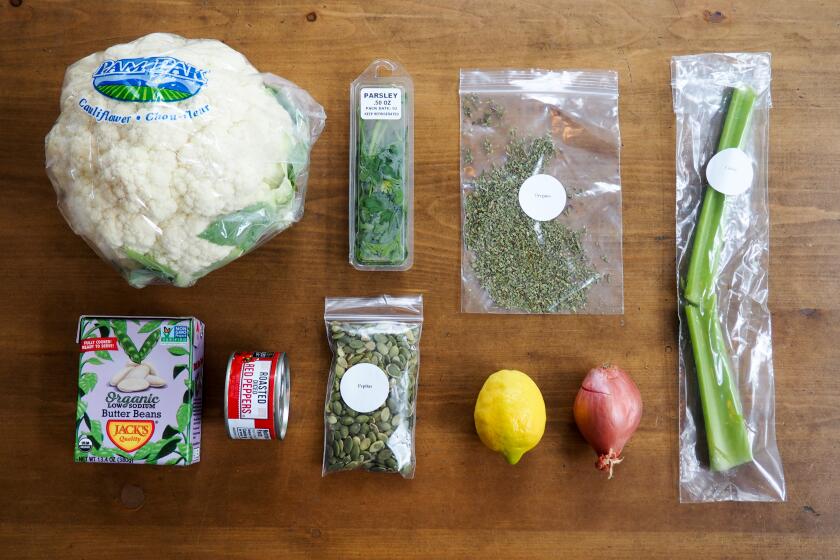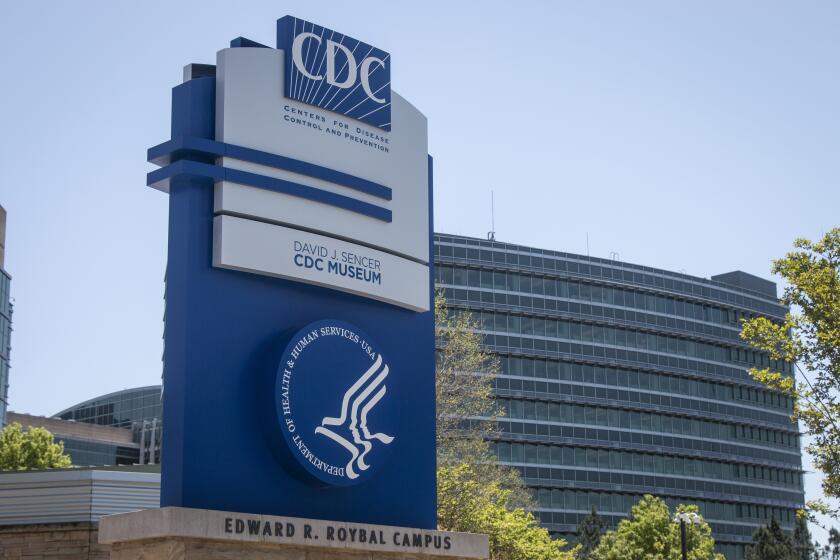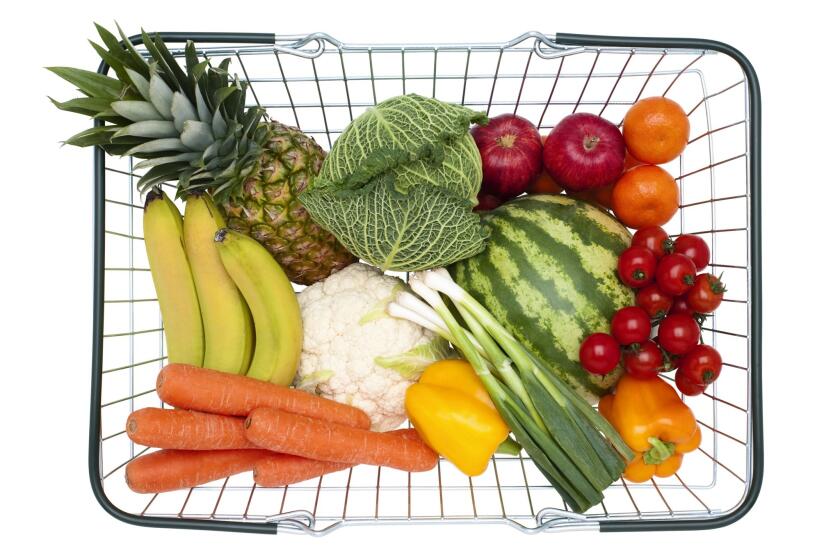Dozens of packaged foods recalled in listeria outbreak. Here’s what you need to know

- Share via
After federal inspectors found potentially deadly bacteria in samples of its products, Modesto-based Rizo Lopez Foods Inc. recalled all of its packaged goods this month, including various types of cotija cheese, yogurt and sour cream.
The bacterium in question, Listeria monocytogenes, can cause listeriosis, a foodborne infection that is often innocuous but occasionally lethal. According to the U.S. Food and Drug Administration, one particular genetic strain of the bacterium has been tied to infections dating back to June 2014.
The agency investigated the string of infections in 2017 and 2021 and found a probable link to queso fresco and similar cheeses, but it couldn’t tell which company or companies had sold the products. Then in January, health officials found the same strain of listeria in a sample of Rizo Bros Aged Cotija. Tests by the FDA at Rizo Lopez Foods’ manufacturing plant also found a sample with that strain, prompting the company to voluntarily recall its entire product line.
Since then, numerous manufacturers of packaged foods that contained Rizo Bros cheeses have recalled their products. These include salads and prepared meals from Dole, Trader Joe’s, Von’s, Costco, Albertsons and Bristol Farms.
Here are a few strategies that experts and food safety officials recommend to ensure that meal-kit supplies and ready-to-heat meals are safe to eat.
Only 26 infections linked to this strain have been reported to the U.S. Centers for Disease Control and Prevention, but the CDC says that many people who contract listeria don’t report it. The agency interviewed 22 of the people infected, and 16 said they’d eaten queso fresco, cotija or similar cheeses.
Considering the number of products that Rizo Lopez has sold and the small number of reported cases, the odds of someone falling dangerously ill seem slim. Nevertheless, the FDA recommends that people check their refrigerators and freezers for recalled products and throw away any they find.
Here’s what you need to know about the disease and the recent recalls.
What is listeria?
Technically, the term refers to the bacteria, but it often is used instead to refer to listeriosis, the illness. Unusually hardy, the bacteria can survive refrigeration and even freezing, the Mayo Clinic says.
Potential breeding grounds for the bacteria are moist environments, soil, water, decaying vegetation and animals, the FDA says. Food can pick up the bacteria by coming into contact with contaminated surfaces or environments; pets who eat contaminated foods can also spread it through the home.
What are the symptoms of a listeria infection?
According to the Mayo Clinic, “healthy people rarely become ill from listeria infection.” If you do feel symptoms, they may start like a stomach bug, with vomiting and diarrhea beginning up to 24 hours after eating contaminated food and lasting one to three days. But this kind of illness is rarely diagnosed, the CDC says, because laboratories do not usually look for listeria when testing patients’ stool samples.
The threat is that the infection will spread beyond the stomach, becoming invasive.
According to the CDC, for those who are pregnant, the symptoms of invasive listeriosis are usually like the flu — fever, muscle aches and fatigue — but tend to be mild, if they appear at all. But the risk to a fetus is dire; infection during pregnancy “usually leads to miscarriage, stillbirth, premature delivery, or life-threatening infection of the newborn,” the CDC says.
For those who aren’t pregnant, the symptoms can be serious. They include fever, headache, muscle aches, stiff neck, confusion, loss of balance and seizures. Almost 5% of the non-pregnant people who come down with invasive listeriosis die, according to the CDC.
A listeria outbreak likely linked to contaminated deli meat and cheese has sickened at least 16 people nationwide, including one person in California.
Who is most at risk?
Because of the danger to fetuses and newborns, pregnant women are a prime risk group. But so are people with weaker immune systems, because of either their age or a medical condition or treatment regimen that lowers their body’s natural defenses.
The CDC warns that people 65 and older are four times more likely to contract listeriosis than others are. People with cancer are 10 times more likely, and people who need dialysis are 50 times more susceptible.
How is listeria transmitted?
It’s a foodborne disease, which means you get it from eating something contaminated with the bacteria. And those are found most often in unpasteurized dairy products and improperly processed meats, the Mayo Clinic says.
How can you avoid getting infected?
First and foremost, the CDC advises not to eat any of the dairy products manufactured by Rizo Lopez Foods or its customers. In other words, check the recall list (see below, but also check for updates at the FDA’s listeria outbreak web page) and don’t consume those products.
If you had any of those products in your refrigerator or freezer, you should sanitize any surfaces or containers that they touched, following the FDA’s guidelines for safe handling and cleaning. Otherwise, the hardy listeria bacteria will troop across surfaces to contaminate other products.
Montebello-based company recalls enoki mushrooms suspected as the source of a listeria outbreak that has infected 36 people and killed four.
Where have listeria infections been reported?
The 26 cases tracked by the CDC are primarily spread across the southern and western United States. The largest number of cases — 8, or 30% of the total — have been in California. Arizona and Colorado have each seen four cases, Texas and Tennessee each have two reported cases, and six other states each have one.
Which products have been recalled?
Rizo Lopez has recalled nearly 60 products, most of which are Mexican cheeses and cremas under the brand names Tio Francisco, Rizo Bros, Casa Cardenas and Campesino.
In addition, the Rizo Lopez recalled product line includes:
- Cotija cheese, 16-ounce packages by Food City
- Cotija Enchilado cheese, 16-ounce packages by Food City
- Crema Mexicana, 16-ounce packages by Food City and Santa Maria, and at retail deli counters by San Carlos
- Fresco cheese at deli counters by San Carlos, El Huache and La Ordena
- Oaxaca cheese, 16-ounce packages by Food City, and at retail deli counters by San Carlos
- Panela cheese, 16-ounce packages by Food City, and at retail deli counters by San Carlos, Dos Ranchitos and La Ordena
- Queso Crema, 16-ounce packages by Food City, and at retail deli counters by San Carlos
- Queso Fresco, 10- and 12-ounce packages by Don Francisco, 14-ounce packages by Rio Grande, 16-ounce packages by Food City, and at retail deli counters by San Carlos, Santa Maria and Dos Ranchitos
- Ricotta cheese, part skim and whole milk varieties, 15-ounce packages by 365 by Whole Foods Market
The recent fruit recall involving produce sold at Ralphs, Trader Joe’s, Costco, Food 4 Less and other grocery outlets due to possible contamination with listeria may have people wondering how the bacteria comes into contact with food.
But wait, there’s more. The FDA on Wednesday released a list of 16 recalled processed food items made in part with dairy products from Rizo Lopez. The brands on the list were Bright Farms, Campesino, Casa Cardenas, Dole, Don Francisco, Don Pancho, Dos Ranchitos, El Huache, Food City, Fresh & Ready Foods, Fresh Express, H-E-B, Jack & Olive, La Ordena, Marketside, Maverick Foods, President’s Choice, Ready Pac Bistro, Rio Grande, Rizo Bros, Rojo’s, San Carlos, Santa Maria, Sprig & Sprout, the Perfect Bite Co., Tio Francisco, Trader Joe’s, and 365 by Whole Foods Market. Some of the 16 items were sold by multiple brands.
Some supermarkets also sold unbranded taco kits, wraps and meals that included recalled Rizo Lopez cheeses. These were Albertsons, Bristol Farms, Carrs-Safeway, Costco, Eagle, Lucky, Pavilions, Randalls, Safeway, Save Mart, Shaw’s, Sprouts, Star Market, Stater Bros. Markets, Tom Thumb and Vons.
More to Read
Sign up for Essential California
The most important California stories and recommendations in your inbox every morning.
You may occasionally receive promotional content from the Los Angeles Times.













